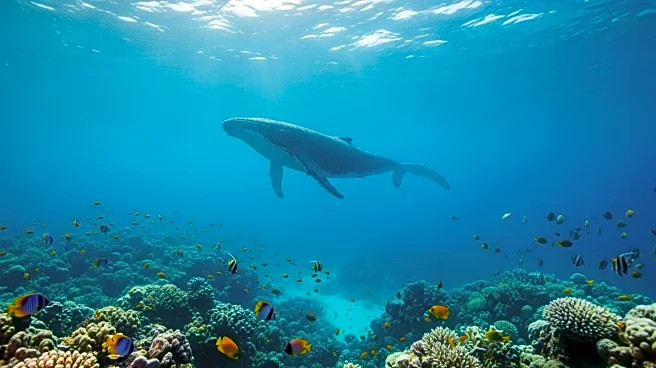What's Happening?
The International Maritime Organization (IMO) is emphasizing the protection of the marine environment on World Maritime Day 2025. This year's theme, 'Our Ocean, Our Obligation, Our Opportunity,' underscores the maritime sector's role in reducing pollution, curbing greenhouse gas emissions, and preventing biodiversity loss. Secretary-General Arsenio Dominguez highlighted the IMO's efforts to balance industry needs with environmental protection through international regulations and technical support. Key initiatives include the 2025 Action Plan to Address Marine Plastic Litter from Ships, a new regulatory framework on biofouling management, and the draft IMO Net-Zero Framework. Additionally, the Mediterranean Sea has been designated as an Emission Control Area, limiting sulfur content in fuel oil to reduce air pollution. The Hong Kong International Convention for ship recycling has also come into force, ensuring environmentally sound practices.
Why It's Important?
The focus on marine environment protection is crucial as the shipping industry significantly impacts global ecosystems. By addressing marine plastic pollution and emissions, the IMO aims to mitigate environmental damage and promote sustainable maritime practices. These efforts are vital for preserving marine biodiversity and ensuring the health of oceanic ecosystems, which are essential for global climate regulation and food security. The initiatives also align with broader international commitments, such as the High Seas Treaty and the UN Ocean Conference outcomes, reinforcing the maritime sector's role in achieving sustainable development goals. Stakeholders, including governments, industry, and civil society, stand to benefit from a healthier marine environment, which supports economic activities and livelihoods dependent on ocean resources.
What's Next?
The IMO will continue to advance its environmental agenda with upcoming discussions on the adoption of the Net-Zero Framework in October 2025. This includes regulations for a new global fuel standard and greenhouse gas emissions pricing mechanism for ships. The organization is also extending the GloNoise Project to help member states implement guidelines for reducing underwater radiated noise. These steps are expected to further enhance the maritime sector's sustainability and environmental responsibility. The IMO's initiatives will likely prompt responses from various stakeholders, including increased collaboration and investment in green technologies and practices within the industry.
Beyond the Headlines
The IMO's initiatives reflect a growing recognition of the ethical responsibility to protect marine environments. The emphasis on reducing underwater noise and managing biofouling highlights the complex challenges of balancing industrial activity with ecological preservation. These efforts may lead to long-term shifts in industry standards and practices, fostering innovation in sustainable shipping technologies. The focus on marine protection also raises awareness of the interconnectedness of global ecosystems and the need for comprehensive international cooperation to address environmental challenges.









